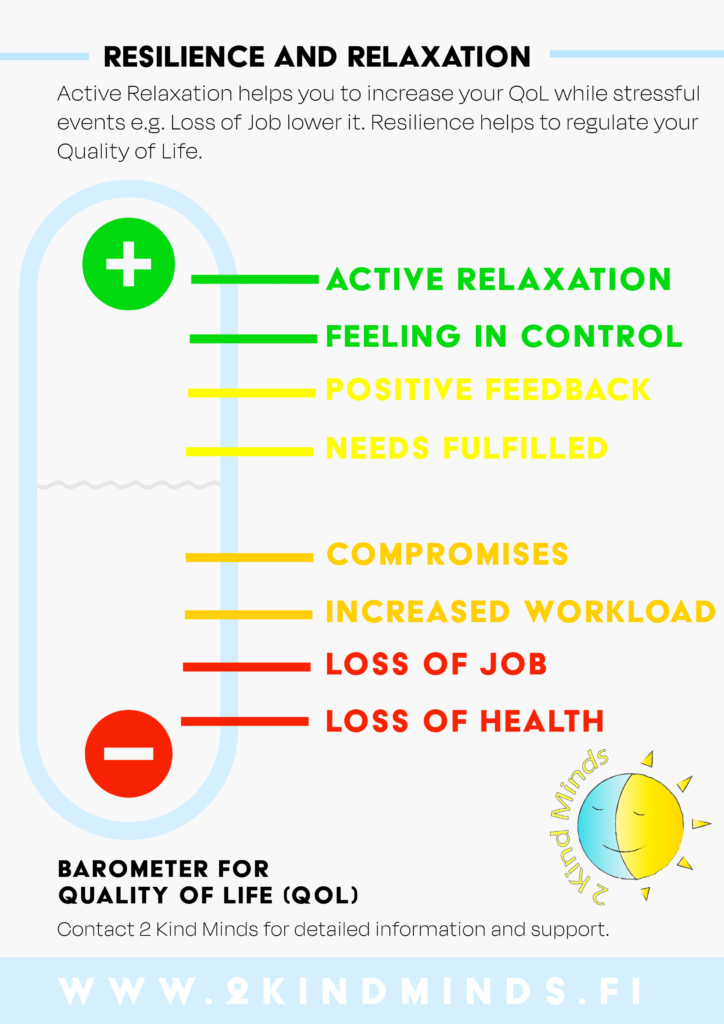
How Resilience and Relaxation improve your Quality of Life
Resilience
When we talk about Resilience, we can think of it as the strength to withstand difficult times. We might feel like we need to push ourselves and appear indestructible like a rock in the sea, withstanding all weathers. However, originally the word resilience derives from the Latin word resilire, which means “to jump back”. This means it can be rather compared to how plants like grass or bamboo bend during heavy rain, rather than break. This flexibility towards difficult circumstances was first mentioned in a study by Emmy Werner in the year 1955, in which she observed the development of children in Kauai. During this long-term study different circumstances seemed to have a special impact on the course of their personal development. Since then the Dunedin longitudinal study came to the same conclusions:
There are many factors that influence our ability to react to difficult or stressful events. A difficult start in life, impacts our lives from early on and we will have to work harder than others to withstand the same amounts of stress. However, this is not the end of the story.
Nature and Nurture
Resilience depends on many factors, which impact our physical and psychological development. We often think that the nature of our being is something we might not have much of a say over. That our static genes define how we look and to a degree what we do, which includes how we cope with difficulties. But did you know that genes are in fact flexible?
It was shown that genes react and adapt to changes in the environment. This flexibility points out the reciprocal influence of nature and nurture. As a result taking care of ourselves by ensuring a healthy lifestyle can help us to stay healthy and resilient or improve our current state. The level of resilience can be actively improved. This healthy lifestyle is depending on many factors, such as stable routines, which help us to achieve enough sleep, good nutrition, hydration and a good ratio of work and leisure time.
Believe it or not: You are already resilient!
The fact that you made it this far in life and that so far you have made it out of all the difficult situations alive, is a clear sign that you are resilient. Our clients tell us that they feel like they don’t know how to continue on, that they feel overwhelmed with stress, that they have already been living with high levels of stress for such a long time and aren’t aware anymore how it feels like to be balanced.
Most feel overwhelmed with stress, and struggle to see a way out. One of the ways that stress lowers resilience is by making it impossible to think creatively about solutions. When we are experiencing high levels of stress we are often incapable of remembering all the tools we have to help ourselves and all the strategies we could apply, not to mention creative combinations of either.
Stress is natural, which is why our body is adapted to react quickly and regulate the stress level after the danger is over. This resilience mechanism helps us to regulate our quality of life. Unfortunately nowadays stress seems to be omnipresent, which often results in chronically high stress levels. This is often as strenuous as running a marathon every day. The body is not designed for that and the result is extreme exhaustion.

Using the results of the most current studies about the topic and taking control of your own stress will make you more resilient and on top of that, it will increase your self-esteem and stabilize your performance and work.
Taking control
When we have first encountered an extreme situation, we feel empowered after making it through. We will experience the feeling that we have grown through the process. This is the natural way of improving our resilience.
Another way that we can become more resilient is by learning how to take control of our stress levels. Right after a stress reaction, that is caused by changes in the environment, our mind and body tries to return to homeostasis.
When an experience creates so much fear, that the realisation that you made it through is replaced by the fear of recurrence, then this experience will not build resilience and will keep you from returning to homeostasis. This fear will make you feel like you failed and that you might fail again. When we lack a plan on how to tackle a certain situation, we might start to feel helpless, weak, might experience a change in weight or become more forgetful.
We need to understand what sets these two experiences apart. Could it be the severity of the event or the level of stress and the amount of control we believe we had during the event?
The level of experienced stress differs highly from person to person, when they are confronted with the same event. That does not mean you are doomed to fail. It just means that you will need to try again with better preparation.
The first step is always to regain control. One way to achieve that is by understanding the most important limiting factor is our fear (name the beast!). Once we accept that we are afraid, we can take action to overcome this fear.
In the case of intense anxiety we can start by learning a technique that keeps our stress level and the correlating anxiety level down.
Good News: You cannot be afraid and relaxed at the same time!
Relaxation
Actively Controlling Well-being
Physical Relaxation is a cornerstone of Stress Management. The body cannot be relaxed while the mind is stressed and the other way around. During a stressful situation our body will be flooded with hormones, which ensure that we are physically able to flee or fight. This state involves a reduced immune system as well as a reduced ability to plan or think, which is the opposite of what we usually need to be healthy, happy and productive at work.
Regulating the stress level will help us return to our former performance level. How quickly this is possible, highly depends on our resilience – the flexibility to bounce back. This is why active relaxation is so important especially for people who suffer from decreased resilience because of a genetic predisposition or problematic environmental factors.
Active Relaxation techniques such as:
- Breathing exercises,
- Progressive Muscle Relaxation,
- Awareness training
- And individual resources such as sports or other hobbies,
will regulate your stress level more effectively than waiting for it to return to its initial homeostasis naturally. Being able to access tools which help you to stay in control will enable you to think clearly, make better decisions and increase your self-esteem. All this will benefit your flexibility to bounce back from difficult events, which is an increased level of resilience.
Life-long Learning
It is never too late to start something new and there is always room for improvement. Our resilience decreases naturally over time by the limitations posed by continuous age. This may trigger anxiety. Extreme levels of stress have the same effect. Moving your body regularly is always recommended as much as challenging yourself with crossword puzzles or sudoku to keep the mind flexible. The newest addition to this self-care and life-long learning trend is the chance to become more resilient by staying calmer and more relaxed.
Relaxation is a Key Skill for greater Resilience
This is what makes the ability to use effective relaxation strategies to calm yourself down when you are feeling stressed so valuable. By applying effective relaxation techniques that work for you and in that particular moment, you can lower your stress levels and return to the homeostasis that allows creative problem solving.
In our next blog post you will learn about one thoroughly researched and especially effective relaxation technique. In countless clinical and non-clinical settings it has significantly reduced hypertension, fatigue and stress symptoms as well as improved sleeping and lowered anxiety. And guess what, we are not talking about mindfulness meditation. If you are interested in finding out which technique we are talking about you should read next week’s blog post.
Photo by Andrea Caramello on Unsplash